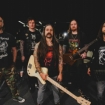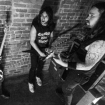Murder, gun fights, gambling and all flavors of depravity — this was the norm for Fort Worth, Texas' infamous Hell's Half Acre neighborhood at the tail end of the 19th century. It was a time when outlaws like Butch Cassidy and the Sundance Kid ran through the violent Wild West ward for a mix of bloodshed and bordello patronage.
These days, Fort Worth is a friendlier spot where one can blissfully bike around at night — at least so says Fugitive leader Blake Ibanez, who spent most of his youth here. The guitarist admits he couldn't wait to escape the sleepy city for nearby Denton to start college; he then spent a good chunk of the last decade touring the globe as part of crossover-thrash titans Power Trip. But the older Ibanez got, the more he began to crave Fort Worth's relaxed atmosphere; he moved back in 2018.
Ibanez settled in and life was going great, but when Power Trip vocalist Riley Gale unexpectedly died in 2020, his personal and creative worlds came crashing down. Ibanez was crushed. "Obviously it's never not going to be tragic and sad, what happened," he contemplates of Gale's death. In the wake of losing a close friend and musical partner, Ibanez was left foundering, unsure of how to move forward.
It took some time, but he's since found the path with Fugitive. Featuring fellow locals from Skourge, Creeping Death and more, the extreme-metal supergroup is a triumphant, hard-riffin' return for Ibanez — one that takes stock of its members collective past, while also ushering in a new wave of Texas heaviness.
Befitting their moniker, when Fugitive started writing their death-and-hardcore-spiked debut EP, Maniac, vocalist Seth Gilmore (also of Skourge) told Ibanez it'd be sick to shout-out their hometown's raucous history on a ripper called, you guessed it, "Hell's Half Acre."
"He wanted to write about real shit," Ibanez recalls, adding of the local lore, "Hell's Half Acre … used to be a lawless, crazy place … just all the fucking debauchery you could think of. To imagine a place like that now is kind of hard."
As far as history lessons go, the track is more evocative than hard fact, Gilmore more generally growling about the gore-oozing "lines of victims" in Hell's Half Acre. But Gilmore also dips into some first-hand hell-raising on "Maniac," a biographical account of becoming "caged like a beast" during a brief stint in county jail. "He's a very well-behaved guy, normally," says Ibanez, "but ... he got caught in the middle of some stupid situation involving one of his friends. … It's a bit of an inflated version of that story."
Ibanez and Co. took Fugitive public this past summer with the release of Maniac and a much-anticipated debut performance at Dallas' Wrecking Ball Metal Madness fest (followed a week later by a spot at Psycho Las Vegas). Fugitive slammed through those first sets. But it'd been more than two years since Ibanez had stepped onstage, and the performances left him with a serious case of bangover. When reached by Revolver, he'd just returned from a massage session in Dallas to work out the kinks in his back and neck. "I'm trying to get back to where I was," the guitarist says of reconditioning his body, though the sentiment could apply more broadly to Ibanez's musical return.
Founded in the spring of 2022, Fugitive finds Ibanez and Gilmore joined by Creeping Death drummer Lincoln Mullins, guitarist Victor Gutierrez and bassist Andy Messer. Ibanez met Messer more than 15 years ago when they were both studying in Denton; Messer also played in Stymie, a Screeching Weasel-like pop-punk band Ibanez thinks may have played at Power Trip's first show. Ibanez has built a strong rapport with Gilmore since returning to Fort Worth, the pair often meeting for breakfast to talk music and life. Mullins is a more recent confidante, but he's synced up nicely with Ibanez as both a friend and the rhythmic back-bone of Fugitive.
"There's nothing that creates a bond between friends like being in a band, getting into the trenches and writing songs and performing," Ibanez reveals. "It's a special thing. I've always known that."
While the new band appears to be a perfectly natural fit for Ibanez, Fugitive's formation was downright serendipitous. The guitarist had been learning a set of material for an undisclosed metal band that asked him to fill in for some live dates. While that ultimately didn't work out, Ibanez found unexpected inspiration from the D-standard guitar tuning that project required. The new tuning — a chunky, full-step lower than what he'd normally riff in for Power Trip — jolted him out of a bout of pandemic writer's block and had him feverishly laying down demos that appealed to his love of cult act Death Breath, as well as iconic lead players like Angus Young and Eddie Van Halen.

"A lot of rock & roll guitar solos played over crispy death-metal riffs," he sums up of the approach that would lead to Maniac. Along with the previously mentioned "Hell's Half Acre" (which started as a potential Power Trip piece before being reworked for Fugitive with a rotted-out back-end groove), other highlights on the five-song debut include the thrashing title-track (pure buzzsaw savagery, until Ibanez goes bluesy with a solo) and the doom-laden, detuned take on Bathory's raging "Raise the Dead."
Fugitive is Ibanez quite literally playing within a different tonal range than Power Trip, but it's hard not to hear similarities between the two projects. ("Well, yeah… it's the same person writing," Ibanez deadpans.) Though the guitarist is proud of his work with Power Trip, he notes there's a unique freedom to the "clean-slate" experience of Fugitive.
"With Power Trip, we've written four albums of material, so when you start trying to write new songs it's kind of hard. You can't write a song that's an inferior version of a song that's already in your set. There are all these factors that make it difficult to write new, engaging, exciting music."
That's not to say Power Trip aren't trying. In fact, the guitarist reports the surviving members tracked "a record's worth of music" about a year ago. These days, Ibanez is more likely to get together with rhythm guitarist Nick Stewart to watch football than share riffs (though the latter happens occasionally). Ibanez does, however, jam with Power Trip's Philadelphia-based drummer Chris Ulsh whenever he visits Texas.
When asked who might sing on the new tracks in the absence of the late Riley Gale, Ibanez says the conversation has been broached privately, but there's nothing to reveal on that front just yet. "The goal is to maintain integrity and do everything with respect and honor to [what] we've done," Ibanez explains, adding of a potential timeline: "When it reaches that standard, it'll happen."
For the moment, Ibanez's attention is on Fugitive. Maniac, originally a digital-only release, gets a physical release in 2023 via 20 Buck Spin; and more festival dates are in the quintet's future. Even so, he notes that this isn't likely to become a full-time band. Mullins is dedicated to slamming with the hard-touring Creeping Death; Gutierrez is currently a live bassist with Houston grunge-gaze act Narrow Head; Messer is also a live guitarist with alt-rock veterans the Toadies. Ibanez says Gilmore isn't a natural road dog, either. But after a couple years off, the guitarist says he is beyond stoked to bring Fugitive out in the open when he can — backaches be damned.
"Getting back onstage felt really good," Ibanez states. "It's definitely put me in a really good head-space, versus where I was … Not putting anything out for years was hard."












